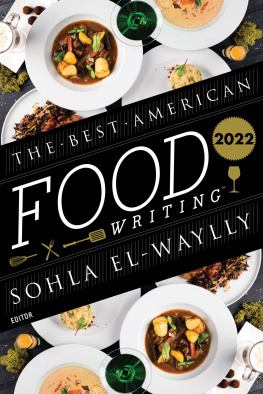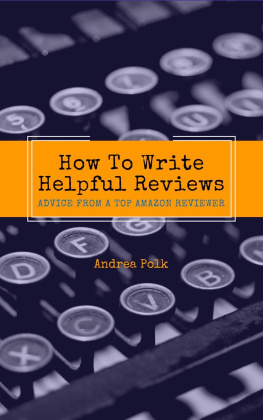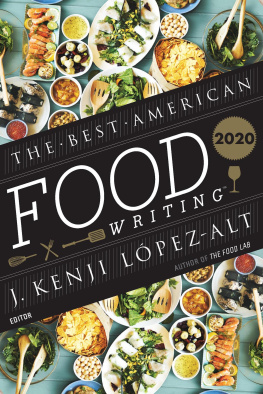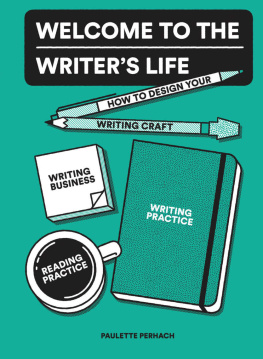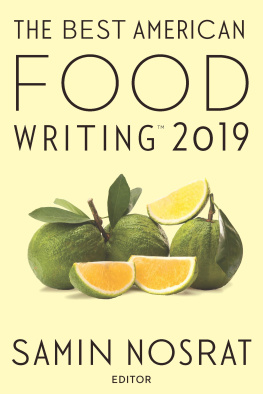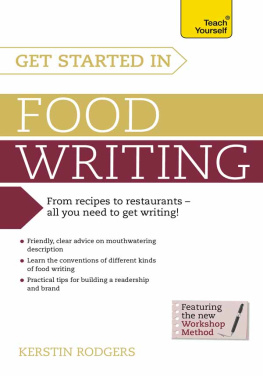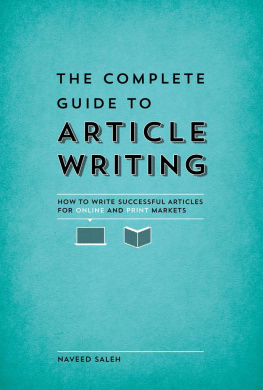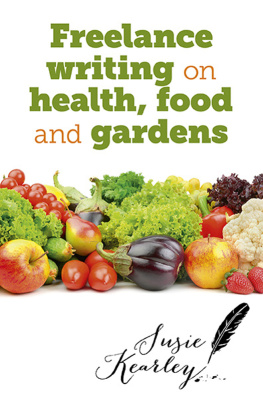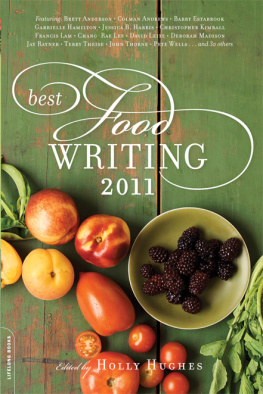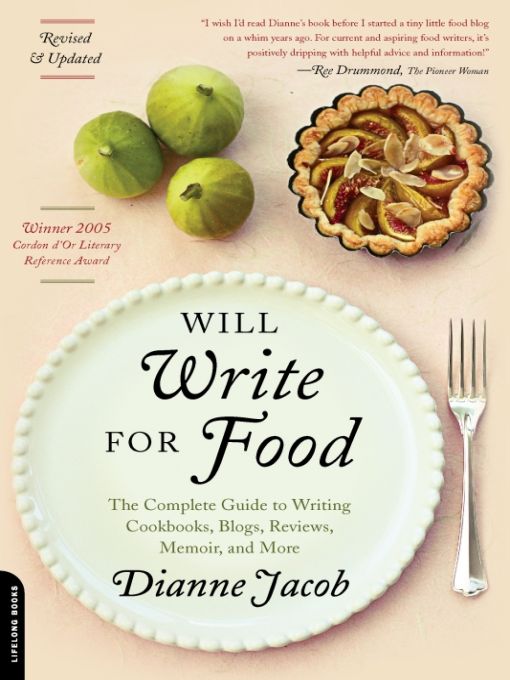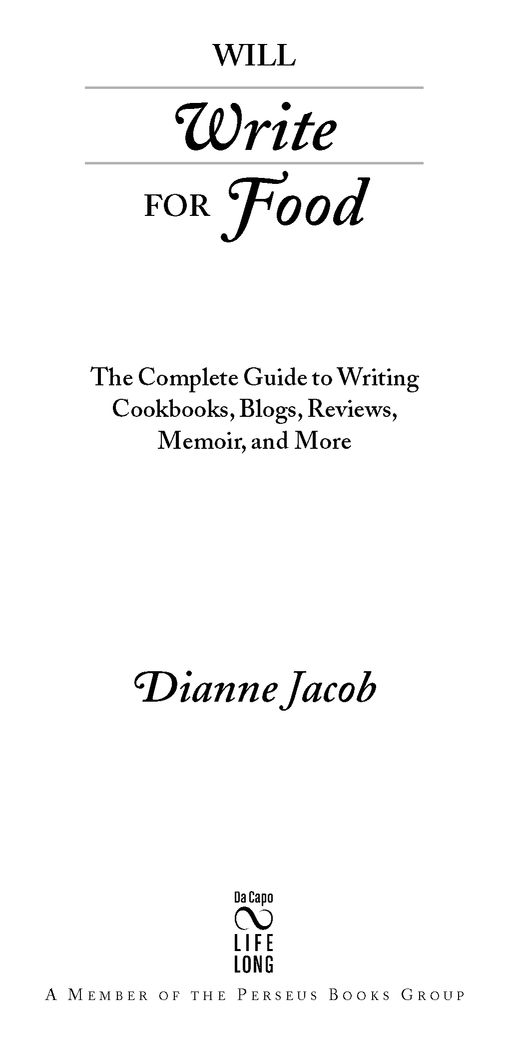Table of Contents
Praise forWILLWriteFORFood
Will Write for Food is a concise, illustrative and eminently useful guide to the nuts and bolts of professional food writing. Dianne Jacob gets right to the heart of what it takes not just to writebut to write wellabout food. And shes managed to wrangle a remarkable group of veterans to share their experiences and examples.
Anthony Bourdain, author of the New York Times bestseller Kitchen Confidential
Considering todays food-writing labyrinth, Will Write for Food leads writers to success, step by step. Its a must on my cant-do-without bookshelf and a resource I always recommend to food writers.
Antonia Allegra, Director of the Symposium for Professional Food Writers at The Greenbrier, and Food Writing Coach
Dianne has saved me so much trouble about what to tell would-be food writers who might someday have my job: Buy Diannes book!
Nancy Leson, Seattle Times food and restaurant writer
Required reading for everyone interested in learning how to translate their passion for food into words. Dianne Jacob offers up a smorgasbord of practical advice for anyone who has ever aspired to write about food, and she shows how to make writing a tasty and lucrative pastime.
Darra Goldstein, Editor-in-Chief, Gastronomica: The Journal of Food and Culture
Youll find everything you need to know about becoming a food writer in this indispensable information-packed book. And if youre already a food writer, this book will help you become a better one. Dianne Jacob takes you by the hand through every step of the process from hatching an idea to getting published. Useful writing exercises concluding each chapter help sharpen your skills. Dozens of quotes from successful food writers tell how they got started and what their working lives are really like. If food writing is your passion, then grab a copy of Will Write for Food and get busy!
Greg Patent, author of Baking in America
Will Write for Food is a great gift, not just for those who are new to food writing, but for those already ensconced in the business. Diannes clarity, kind suggestions, and nudges and admonitions to work well are truly inspiring.
Deborah Madison, author of Vegetarian Cooking for Everyone
Dianne Jacob has done a masterful job in this book of amassing everything a fledgling food writer needs to know. Whether one yearns to review restaurants for a local newspaper or turn a passion for food into magazine articles, or even a cookbook, Will Write for Food offers invaluable practical advice along every step of the way.
Fran Gage, author of Bread and Chocolate
This book does a great job of covering the nuts and bolts of food writing, for sure, but Jacob delivers much more than the usual advice: She shoots straight about the realities of the business, provides loads of insider insights and practical exercises, and radiates enough genuine enthusiasm to get both beginning writers and seasoned pros up and at em.
Martha Holmberg, former publisher, Fine Cooking magazine
Dianne Jacob has presented budding food writers with a clear blueprint on how to get started in the business.
Michael Bauer, Executive Food and Wine Editor, San Francisco Chronicle
My only complaint about Will Write for Foodand its a big oneis that it wasnt around when I started my career. If youre serious about becoming a food writer, save yourself years of banging your head against the wall in frustration and run to the checkout with this book now.
David Leite, food writer, and publisher and editor of Leites Culinaria
In Will Write for Food, Dianne Jacob combines all the right ingredients for a delectable read.
Joanne Fluke, author of the Hannah Swensen Mysteries series
To my parents, who taught me to appreciate food
as a vehicle for memory and identity; and who loved
a good story, whether they told it themselves or read it
Foreword by David Lebovitz
The pleasure of sitting down to a good meal is not limited to just eating whats set in front of you. It can also be about the sensations or memories associated with it. Perhaps its sitting at a linen-topped table, gnawing on a delicate morsel of stuffed quail while sipping a glass of crisp, clear Sancerre, or standing in a dusty parking lot, slugging down a beer, waiting your turn in front of a taco truck, watching the steaming clouds wafting off the carne asada. Or perhaps youre charring a steak over a glowing fire with your best friends after a long day on the beach, or mixing up a darkly rich chocolate batter by yourself in the kitchen, pouring it into a well-buttered mold, then licking the beaters clean (when no one is looking, of course) before you pop the cake in the oven.
Maybe its flying over an ocean just to slurp down a boiling bowl of handmade noodles while youre squeezed on a firm wooden bench between fixated Japanese businessmen, or you find yourself miserably lost in a train station in rural France, but youve found consolation littering the station floor with irregular flakes from the warm pain au chocolat your nose detected that the baker next door was just taking out of the oven. Or perhaps you watched the scruffy pizza maker in Naples effortlessly toss and spin his dough into near-perfect circles for your pizza while checking out the near-perfect backsides of a group of Swedish tourists.
Food writing is one of the richest, most evocative forms of writing. From recounts of butter-soaked meals in Paris to a dinner of crickets (hopefully not still chirping) in Oaxaca, everything we put in our mouths evokes a response and an emotion. And for many of us, we feel compelled to share these experiences by writing about them. Good food writers are able to recount those meals and feelings not necessarily with precision and perfect prose, but to draw the reader in and make them feel as though they were sitting at the tableor standing at the kitchen counterright alongside us.
Traditionally, food writing was the provenance of glossy magazines and newspapers, which will always be valuable and trusted resources for restaurant reviews and travel pieces. But as the online world has expanded, the line has blurred between professional and non-professional, and literally hundreds of thousands of people with nothing but a keyboard and a screen have become food writers. Within a short amount of time, anyone, anywhere in the world, can sit down in front of a computer or touchpad, write a story or a recipe, and quickly have it reach literally millions of people. Some of these writers get snapped up by the print media and others prefer to keep writing for their own domains. And although there were initially plenty of pessimists, the success stories have surprised even hard-core naysayers who felt that restaurant criticism was only for those with years of writing experience, and recipe writing was only the domain of chefs and cookbook authors. Theres no doubt about it, food writing has changed quite a bit since the first edition of Will Write for Food was published in 2005.
When this book was first released, I couldnt be happier to find that Dianne Jacob, a seasoned editor, had compiled all the information anyone might need to know who wants to explore a career writing about food, in one informative book. Interviews with top food writers and chefs made the book especially helpful, and it was refreshing to find subjects that are often not discussed, such as


